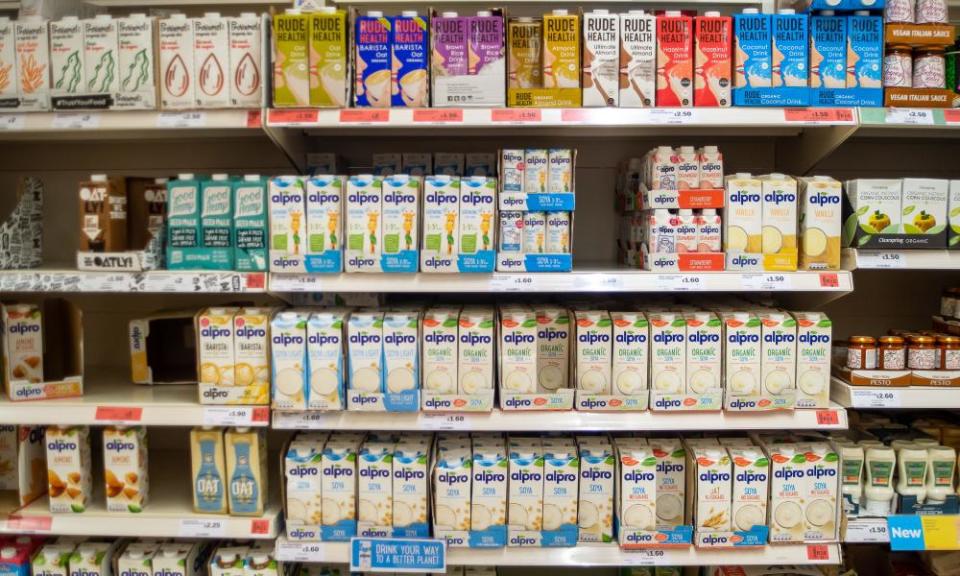Lab-grown dairy is the future of milk, researchers say

For decades, people on plant-based diets were restricted to soya-based options to recreate dairy, until veganism went mainstream and a clutch of palate-pleasing almond, coconut and oat-based alternatives emerged. Last week, Swedish scientists launched a potato milk, equally lauded for its sustainability credentials and criticised for deriving from a humdrum carbohydrate. The holy grail now – according to researchers – is genuine dairy milk, made in a lab.
A growing number of startups from Silicon Valley to Singapore are rapidly joining the race to create the first imitation cow’s milk, based on artificially reproducing the proteins in curds (casein) and whey, that is suitable for mass market consumption.
Scientists say it will recreate dairy’s authentic mouthfeel and temperature resistance, and constitute the perfect texture for vegan cheese, capable of melting just like the real thing.
Related: I’ve been trying milk substitutes in my tea – it’s a stomach-churning experience | Emma Beddington
The quest is big business, with the dairy alternatives market among the fastest growing of all packaged foods, and worth £2.5bn in western Europe in 2020-21, according to new figures from Euromonitor. In the UK, the market has grown by 69% over the past five years, with non-soya-based milks increasing by 129%.
The barrier, according to Marite Cardenas, a researcher at Malmö University working on casein protein, is that mimicking the proteins found in cow’s milk to create lab-grown dairy is a “biotechnological challenge”.
It’s usually done by giving microorganisms a genetic code that enables them to produce real milk proteins through a precision fermentation process – but this is difficult to do on the large scale required for manufacturing.
Cardenas thinks recreating animal products will enable the food traditions many countries are proud of, such as cheese-making, to endure the societal shift to a more plant-based diet.
Mainstream consumers are also more likely to adopt plant-based products if they are as tasty as the real thing, said Mike Leonard, chief technology officer at Motif FoodWorks, which is working with several universities to develop better plant-based foods. “Most of our current options just don’t cut it in terms of an eating experience,” he said.
The only company to have brought protein fermentation-based products to market so far is Perfect Day, a Silicon Valley-based startup. It developed the first whey protein from cow’s milk, and now sells its products across 5,000 stores in the US.
Chief executive and co-founder Ryan Pandya said his company was born out of a desire to figure out “what makes milk, milk”.
He and his co-founders discovered that milk proteins, whey and casein, were the secret: “These complex molecules are perfectly structured to deliver dairy’s unique taste and texture. It’s ideal for providing a rich, creamy, smooth, and indulgent eating experience and excels in product applications requiring solubility, gelation, water-binding, foaming, heat stability, and emulsification.”
The problem is that the price remains prohibitively high for many consumers, at about £8 for a 550ml tub of Perfect Day ice-cream.
This is a focus for another startup, New Culture, which is currently developing mozzarella cheese that melts perfectly for pizza using fermented protein-based milk. Chief executive Inja Radman said the company has progressed enormously over the past two years in technological terms, but scaling this up to commercial manufacturing levels remains a challenge due to the slow process of running trials.
Related: Man v food: is lab-grown meat really going to solve our nasty agriculture problem?
“Despite precision fermentation being around for well over 30 years now, it was typically used to make proteins that are not used in large amounts in their final applications – think enzymes for detergents or insulin. Only in the last five to 10 years has work been done to further extend this technology to food protein production,” he said.
But he predicted that in the future, as the technology develops and governments shift subsidies away from industrial farming, companies like his will be a cheaper option.
This is likely to be sped up by the entry of big consumer companies such as Nestlé and Danone, which are buying lab-grown dairy startups, as well as investment banks “pouring money” into the industry, said Euromonitor’s Maria Mascaraque.
Mascaraque said in the next couple of years the focus is likely to remain on newer ingredients such as potatoes, which are cheap and sustainable, and peas, which are high in protein, and different ways to blend these to make them tastier, but she predicted that in the next 10 years, when it has become more affordable, lab-grown dairy would become the most popular choice.
However, Thomas Sanders, emeritus professor of nutrition at King’s College London, cautioned that any future dairy alternatives must avoid replicating the “ultra processed junk food” currently available on the market and seek to recreate the nutritional value of cow’s milk by adding in B12, riboflavin, calcium. “It doesn’t really matter what adults put in their coffee but I would have concerns about giving [some plant-based] milks to young children,” he said.

 Yahoo Finance
Yahoo Finance 